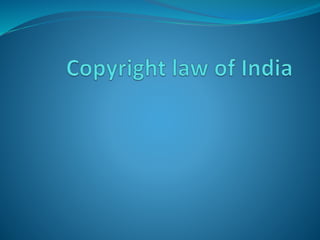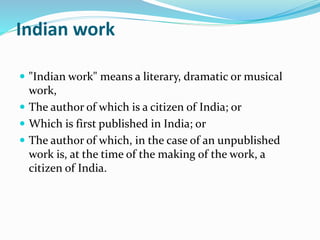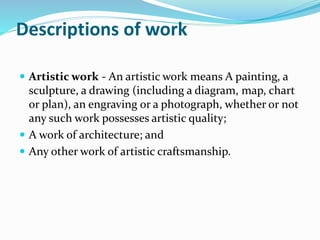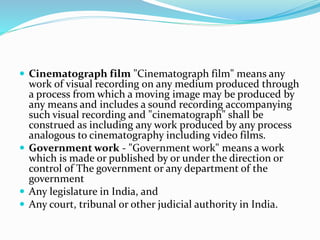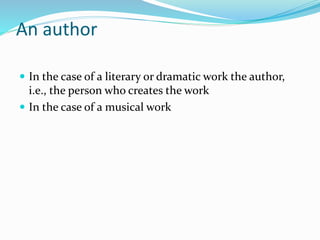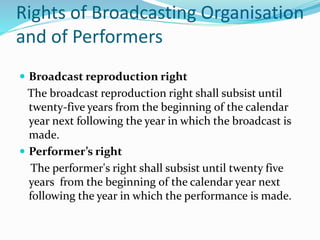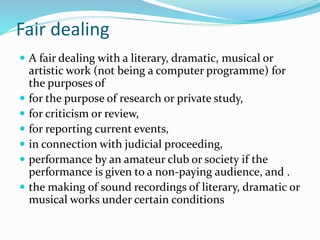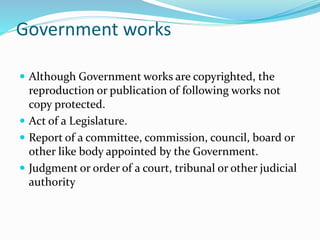Copy right act
- 2. The Copyright Act, 1957(Act No. 14 of 1957) governs the laws & applicable rules related to the subject of copyrights in India. Copyright Law in the country was governed by the Copyright Act of 1914, was essentially the extension of the British Copyright Act, 1911 to India,and borrowed extensively from the new Copyright Act of the United Kingdom of 1956. All copyright related laws are governed by the Copyright Act, 1957The Copyright Act today is compliant with most international conventions and treaties in the field of copyrights. India is a member of the Berne Convention of 1886 (as modified at Paris in 1971), the Universal Copyright Convention of 1951 and the Agreement on Trade Related Aspects of Intellectual Property Rights (TRIPS) Agreement of 1995
- 3. Copyright Copyright is a right given by the law to the creators of literary, dramatic, musical and artistic works and producers of cinematograph films and sound recordings. In fact, it is a bundle of rights including, inter alia, rights of reproduction, communication to the public, adaptation and translation of the work. There could be slight variations in the composition of the rights depending on the work.
- 4. Indian work "Indian work" means a literary, dramatic or musical work, The author of which is a citizen of India; or Which is first published in India; or The author of which, in the case of an unpublished work is, at the time of the making of the work, a citizen of India.
- 5. Descriptions of work Artistic work - An artistic work means A painting, a sculpture, a drawing (including a diagram, map, chart or plan), an engraving or a photograph, whether or not any such work possesses artistic quality; A work of architecture; and Any other work of artistic craftsmanship.
- 6. Musical work "Musical work" means a work consisting of music and includes any graphical notation of such work but does not include any words or any action intended to be sung, spoken or performed with the music. A musical work need not be written down to enjoy copyright protection. Sound recording "Sound recording" means a recording of sounds from which sounds may be produced regardless of the medium on which such recording is made or the method by which the sounds are produced. A phonogram and a CD-ROM are sound recordings.
- 7. Cinematograph film "Cinematograph film" means any work of visual recording on any medium produced through a process from which a moving image may be produced by any means and includes a sound recording accompanying such visual recording and "cinematograph" shall be construed as including any work produced by any process analogous to cinematography including video films. Government work - "Government work" means a work which is made or published by or under the direction or control of The government or any department of the government Any legislature in India, and Any court, tribunal or other judicial authority in India.
- 8. An author In the case of a literary or dramatic work the author, i.e., the person who creates the work In the case of a musical work
- 9. Duration of copyright Literary Dramatic, Musical and Artistic works Photographs lifetime of the author + sixty years from the beginning of the calendar year next following the year in which the author dies Anonymous and pseudonymous works Posthumous work Cinematograph films Sound records Government work Public undertakings International Agencies Until sixty years from the beginning of the calendar years next following the year in which the work is first published .
- 10. Assignment of copyright The author of a work is the first owner of the copyright( Section 17).However, for works made in the course of an author's employment under a contract of service, the employer is the first owner of the copyright. The owner of the copyright in an existing work or the prospective owner of the copyright in a future work may assign to any person the copyright either wholly or partially and either generally or subject to limitations and either for the whole term of the copyright or any part thereof: Provided that in the case of the assignment of copyright in any future work, the assignment shall take effect only when the work comes into existence (Section 18) Section 19 lays down the modes of assignment- assignment can only be in writing and must specify the work, the period of assignment and the territory. Section 19(5) provides that if period of assignment is not specified it shall be deemed to be 5 years and section 19(6) provides that if the territorial extent of assignment is not specified it shall be presumed to extend within India.
- 11. Rights of Broadcasting Organisation and of Performers Broadcast reproduction right The broadcast reproduction right shall subsist until twenty-five years from the beginning of the calendar year next following the year in which the broadcast is made. Performer’s right The performer's right shall subsist until twenty five years from the beginning of the calendar year next following the year in which the performance is made.
- 12. Fair dealing A fair dealing with a literary, dramatic, musical or artistic work (not being a computer programme) for the purposes of for the purpose of research or private study, for criticism or review, for reporting current events, in connection with judicial proceeding, performance by an amateur club or society if the performance is given to a non-paying audience, and . the making of sound recordings of literary, dramatic or musical works under certain conditions
- 13. Government works Although Government works are copyrighted, the reproduction or publication of following works not copy protected. Act of a Legislature. Report of a committee, commission, council, board or other like body appointed by the Government. Judgment or order of a court, tribunal or other judicial authority
- 14. Civil liability Copyright infringement is punishable under Section 63 of the Copyright Act: Offence of infringement of copyright or other rights conferred by this Act. Any person who knowingly infringes or abets the infringement of- (a) the copyright in a work, or (b) any other right conferred by this Act, shall be punishable with imprisonment for a term which shall not be less than six months but which may extend to three years and with fine which shall not be less than fifty thousand rupees but which may extend to two lakh rupees: Provided that the court may, for adequate and special reasons to be mentioned in the judgment, impose a sentence of imprisonment for a term of less than six months or a fine of less than fifty thousand rupees. Explanation.- Construction of a building or other structure which infringes or which, if completed, would infringe the copyright in some other work shall not be an offence under this section.

